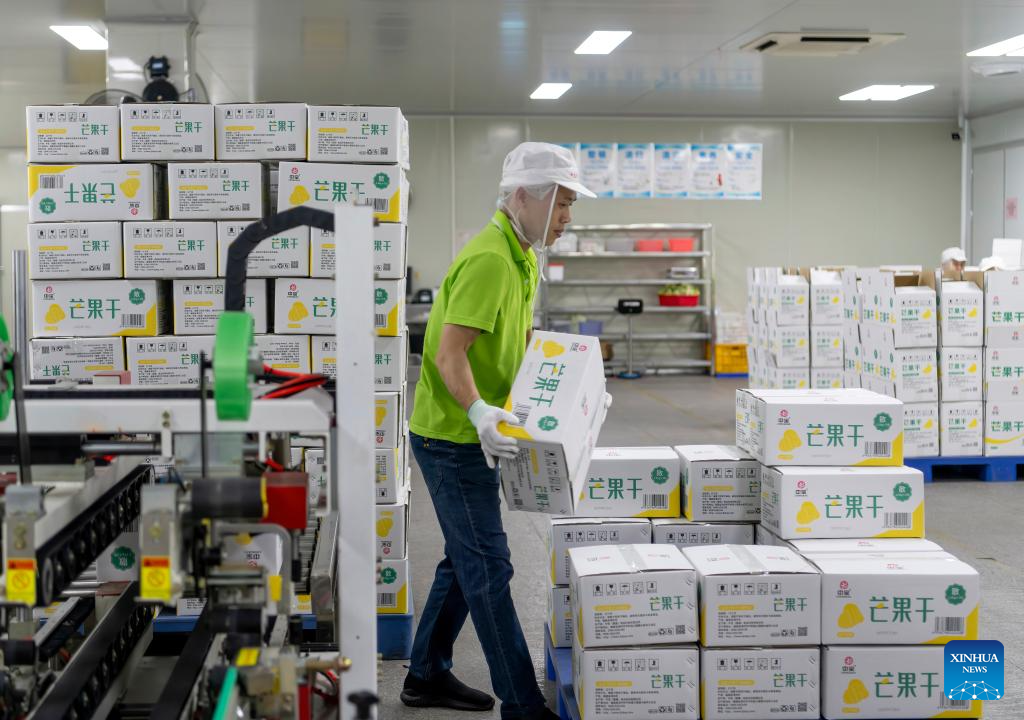
A worker carries a box of dried mango slices at Zhong Bao (Fujian) Food Science & Technology Co. Ltd. in Pinghe County of Zhangzhou City, southeast China's Fujian Province, March 26, 2025. In western Cambodia's Phnom Sruoch district, the abundant sunshine, plentiful rainfall, and fertile soil provide ideal natural conditions for mango cultivation, yielding mangoes featuring tender flesh and rich aroma.
At the mango processing factory, invested and constructed by China's Zhong Bao (Fujian) Food Science & Technology Co. Ltd., in western Cambodia's Phnom Sruoch district, ripe mangoes undergo processes such as washing, peeling, slicing, sugar curing, and drying, finally transforming into sweet and chewy dried mango slices. These dried mangoes are then transported via sea shipping to Zhong Bao (Fujian) Food Science & Technology Co. Ltd. in southeast China's Fujian Province. After undergoing sorting, packaging, and packing, they can reach the shelves of Chinese supermarkets within days.
The Chinese-invested mango processing factory was put into use in January, 2021. Since then, it has not only created employment for over 2,600 local residents but also resolved the critical issue of market access for Cambodian farmers. China's purchase of Cambodian dried mangoes has not only benefited small-scale farmers and workers in this rural area, but also contributed to boosting the local economy. The standards, expertise, and advanced production lines introduced by Chinese enterprises have also helped improve the reputation of Cambodian mangoes in recent years. (Xinhua/Wei Peiquan)
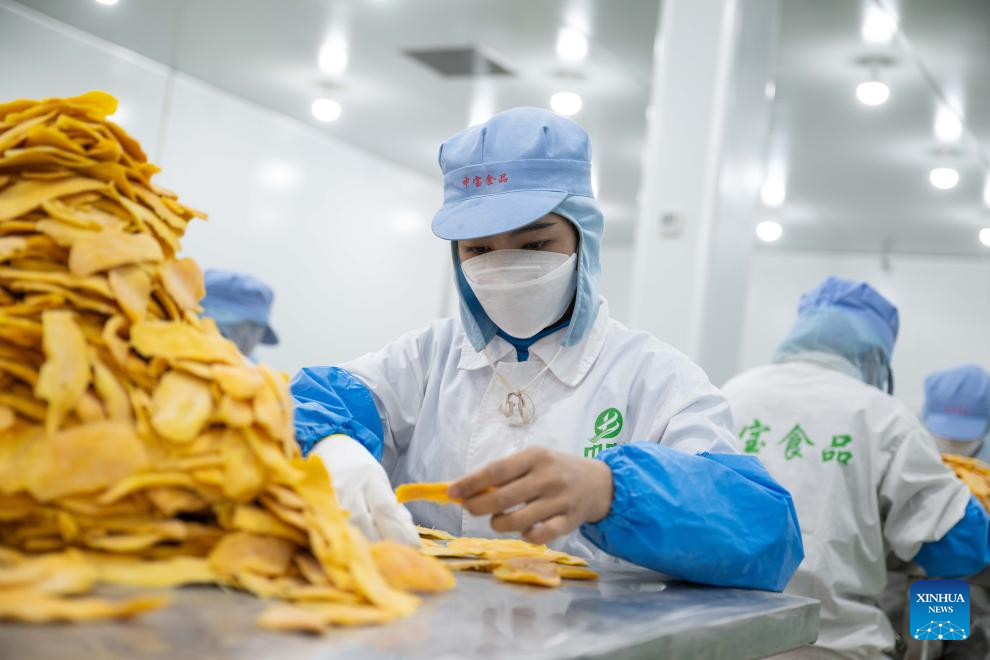
Workers check the quality of dried mango slices at a mango processing factory in Phnom Sruoch district in Kampong Speu province, Cambodia, March 18, 2025. In western Cambodia's Phnom Sruoch district, the abundant sunshine, plentiful rainfall, and fertile soil provide ideal natural conditions for mango cultivation, yielding mangoes featuring tender flesh and rich aroma.
At the mango processing factory, invested and constructed by China's Zhong Bao (Fujian) Food Science & Technology Co. Ltd., in western Cambodia's Phnom Sruoch district, ripe mangoes undergo processes such as washing, peeling, slicing, sugar curing, and drying, finally transforming into sweet and chewy dried mango slices. These dried mangoes are then transported via sea shipping to Zhong Bao (Fujian) Food Science & Technology Co. Ltd. in southeast China's Fujian Province. After undergoing sorting, packaging, and packing, they can reach the shelves of Chinese supermarkets within days.
The Chinese-invested mango processing factory was put into use in January, 2021. Since then, it has not only created employment for over 2,600 local residents but also resolved the critical issue of market access for Cambodian farmers. China's purchase of Cambodian dried mangoes has not only benefited small-scale farmers and workers in this rural area, but also contributed to boosting the local economy. The standards, expertise, and advanced production lines introduced by Chinese enterprises have also helped improve the reputation of Cambodian mangoes in recent years. (Xinhua/Cheong Kam Ka)
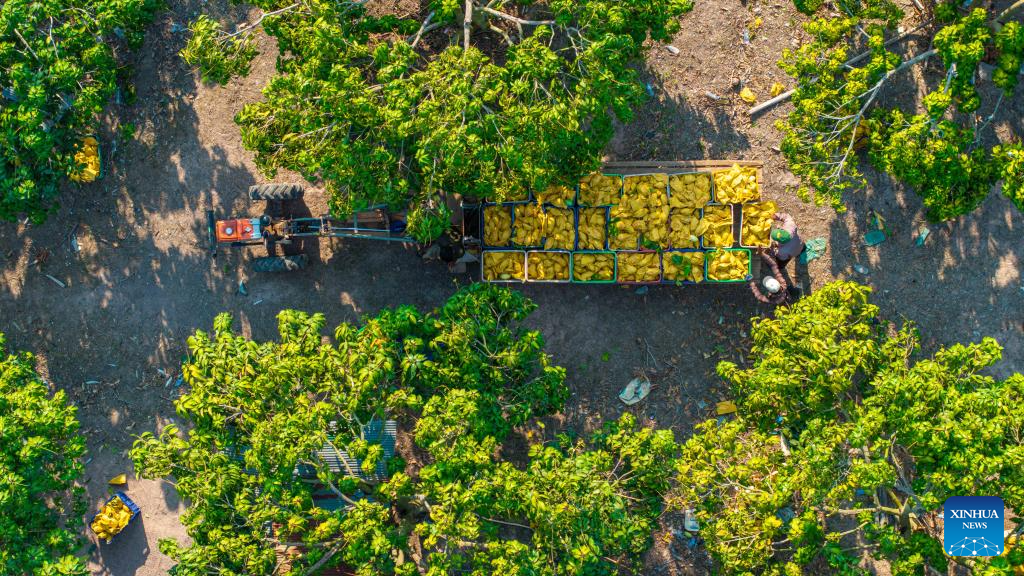
An aerial drone photo shows workers transporting mangoes at a mango orchard in Phnom Sruoch district in Kampong Speu province, Cambodia, March 18, 2025. In western Cambodia's Phnom Sruoch district, the abundant sunshine, plentiful rainfall, and fertile soil provide ideal natural conditions for mango cultivation, yielding mangoes featuring tender flesh and rich aroma.
At the mango processing factory, invested and constructed by China's Zhong Bao (Fujian) Food Science & Technology Co. Ltd., in western Cambodia's Phnom Sruoch district, ripe mangoes undergo processes such as washing, peeling, slicing, sugar curing, and drying, finally transforming into sweet and chewy dried mango slices. These dried mangoes are then transported via sea shipping to Zhong Bao (Fujian) Food Science & Technology Co. Ltd. in southeast China's Fujian Province. After undergoing sorting, packaging, and packing, they can reach the shelves of Chinese supermarkets within days.
The Chinese-invested mango processing factory was put into use in January, 2021. Since then, it has not only created employment for over 2,600 local residents but also resolved the critical issue of market access for Cambodian farmers. China's purchase of Cambodian dried mangoes has not only benefited small-scale farmers and workers in this rural area, but also contributed to boosting the local economy. The standards, expertise, and advanced production lines introduced by Chinese enterprises have also helped improve the reputation of Cambodian mangoes in recent years. (Xinhua/Cheong Kam Ka)
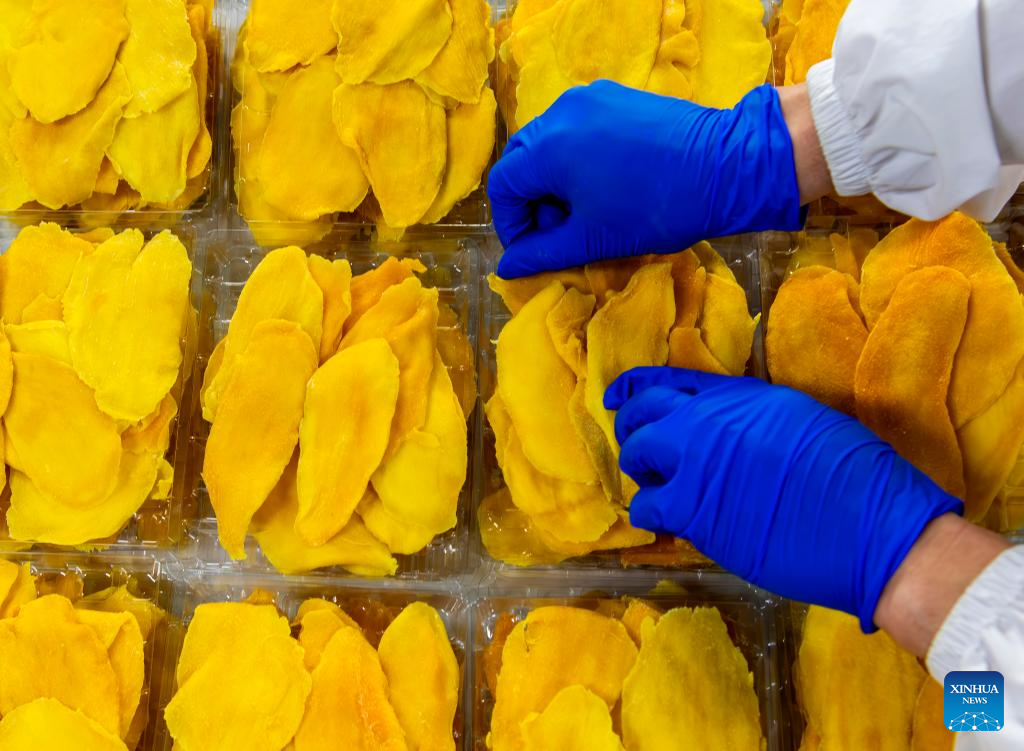
A worker arranges dried mango slices imported from Cambodia on the food processing line of Zhong Bao (Fujian) Food Science & Technology Co. Ltd. in Pinghe County of Zhangzhou City, southeast China's Fujian Province, March 26, 2025. In western Cambodia's Phnom Sruoch district, the abundant sunshine, plentiful rainfall, and fertile soil provide ideal natural conditions for mango cultivation, yielding mangoes featuring tender flesh and rich aroma.
At the mango processing factory, invested and constructed by China's Zhong Bao (Fujian) Food Science & Technology Co. Ltd., in western Cambodia's Phnom Sruoch district, ripe mangoes undergo processes such as washing, peeling, slicing, sugar curing, and drying, finally transforming into sweet and chewy dried mango slices. These dried mangoes are then transported via sea shipping to Zhong Bao (Fujian) Food Science & Technology Co. Ltd. in southeast China's Fujian Province. After undergoing sorting, packaging, and packing, they can reach the shelves of Chinese supermarkets within days.
The Chinese-invested mango processing factory was put into use in January, 2021. Since then, it has not only created employment for over 2,600 local residents but also resolved the critical issue of market access for Cambodian farmers. China's purchase of Cambodian dried mangoes has not only benefited small-scale farmers and workers in this rural area, but also contributed to boosting the local economy. The standards, expertise, and advanced production lines introduced by Chinese enterprises have also helped improve the reputation of Cambodian mangoes in recent years. (Xinhua/Wei Peiquan)
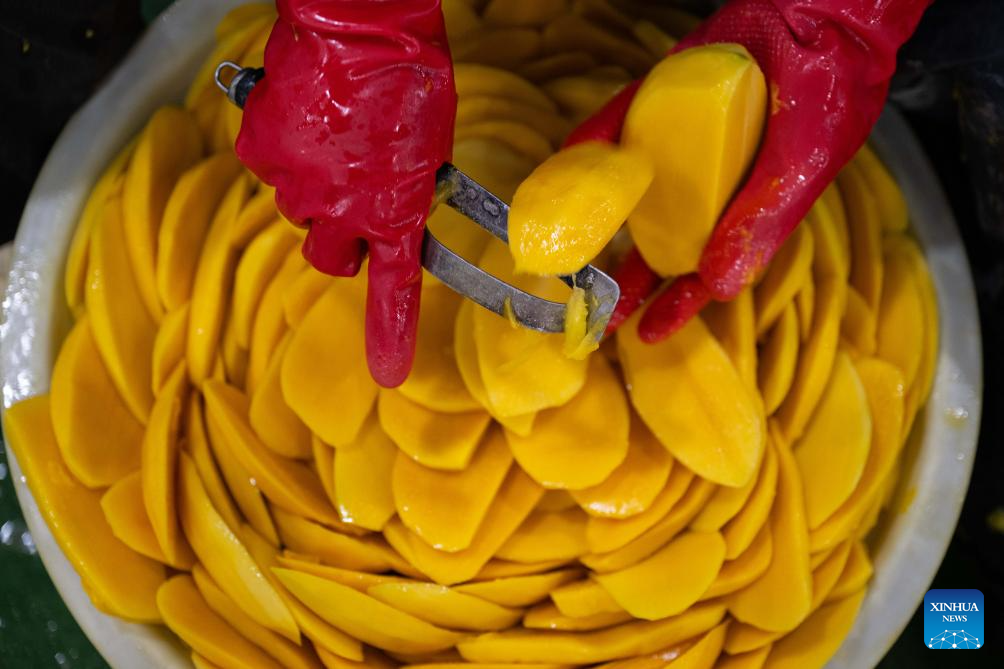
A worker slices a mango at a mango processing factory in Phnom Sruoch district in Kampong Speu province, Cambodia, March 18, 2025. In western Cambodia's Phnom Sruoch district, the abundant sunshine, plentiful rainfall, and fertile soil provide ideal natural conditions for mango cultivation, yielding mangoes featuring tender flesh and rich aroma.
At the mango processing factory, invested and constructed by China's Zhong Bao (Fujian) Food Science & Technology Co. Ltd., in western Cambodia's Phnom Sruoch district, ripe mangoes undergo processes such as washing, peeling, slicing, sugar curing, and drying, finally transforming into sweet and chewy dried mango slices. These dried mangoes are then transported via sea shipping to Zhong Bao (Fujian) Food Science & Technology Co. Ltd. in southeast China's Fujian Province. After undergoing sorting, packaging, and packing, they can reach the shelves of Chinese supermarkets within days.
The Chinese-invested mango processing factory was put into use in January, 2021. Since then, it has not only created employment for over 2,600 local residents but also resolved the critical issue of market access for Cambodian farmers. China's purchase of Cambodian dried mangoes has not only benefited small-scale farmers and workers in this rural area, but also contributed to boosting the local economy. The standards, expertise, and advanced production lines introduced by Chinese enterprises have also helped improve the reputation of Cambodian mangoes in recent years. (Xinhua/Cheong Kam Ka)
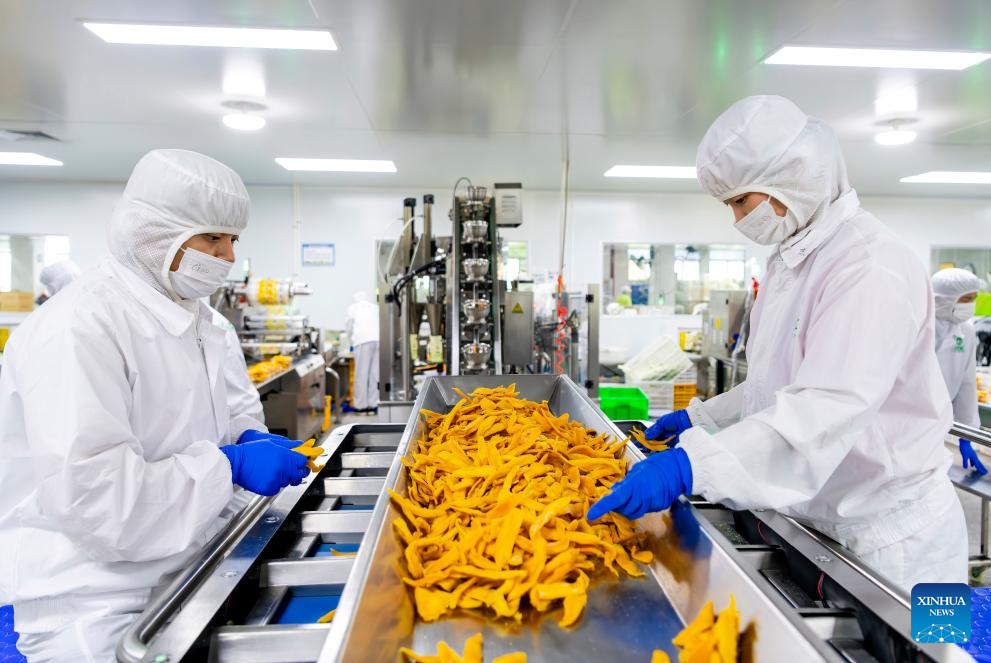
Workers arranges dried mango slices imported from Cambodia on the food processing line of Zhong Bao (Fujian) Food Science & Technology Co. Ltd. in Pinghe County of Zhangzhou City, southeast China's Fujian Province, March 26, 2025. In western Cambodia's Phnom Sruoch district, the abundant sunshine, plentiful rainfall, and fertile soil provide ideal natural conditions for mango cultivation, yielding mangoes featuring tender flesh and rich aroma.
At the mango processing factory, invested and constructed by China's Zhong Bao (Fujian) Food Science & Technology Co. Ltd., in western Cambodia's Phnom Sruoch district, ripe mangoes undergo processes such as washing, peeling, slicing, sugar curing, and drying, finally transforming into sweet and chewy dried mango slices. These dried mangoes are then transported via sea shipping to Zhong Bao (Fujian) Food Science & Technology Co. Ltd. in southeast China's Fujian Province. After undergoing sorting, packaging, and packing, they can reach the shelves of Chinese supermarkets within days.
The Chinese-invested mango processing factory was put into use in January, 2021. Since then, it has not only created employment for over 2,600 local residents but also resolved the critical issue of market access for Cambodian farmers. China's purchase of Cambodian dried mangoes has not only benefited small-scale farmers and workers in this rural area, but also contributed to boosting the local economy. The standards, expertise, and advanced production lines introduced by Chinese enterprises have also helped improve the reputation of Cambodian mangoes in recent years. (Xinhua/Wei Peiquan)
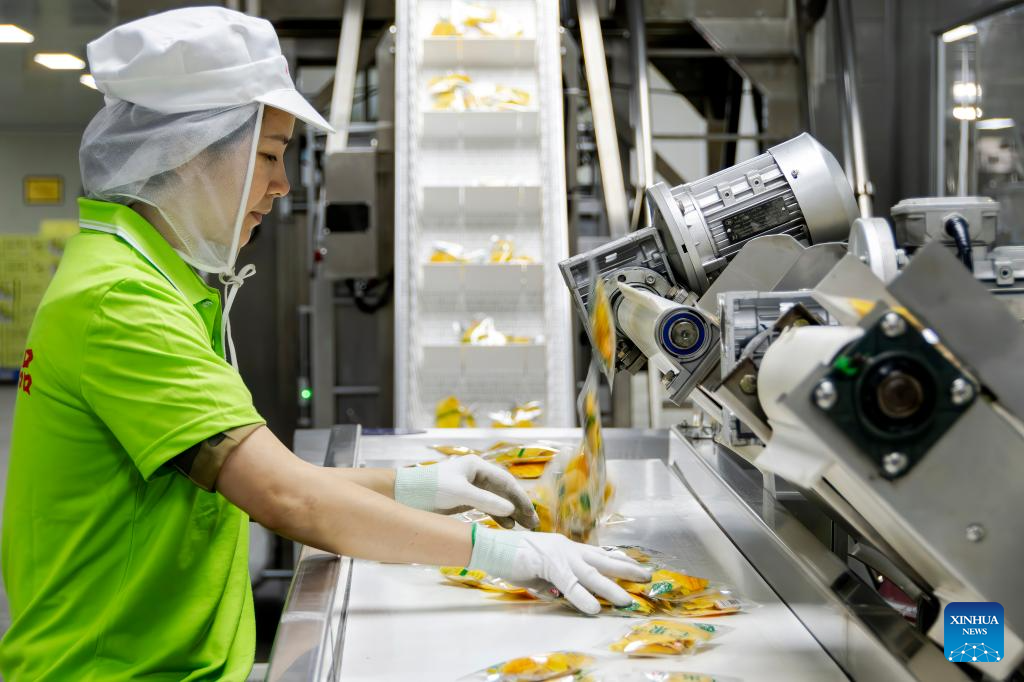
A worker sorts dried mango slices on the food processing line of Zhong Bao (Fujian) Food Science & Technology Co. Ltd. in Pinghe County of Zhangzhou City, southeast China's Fujian Province, March 26, 2025. In western Cambodia's Phnom Sruoch district, the abundant sunshine, plentiful rainfall, and fertile soil provide ideal natural conditions for mango cultivation, yielding mangoes featuring tender flesh and rich aroma.
At the mango processing factory, invested and constructed by China's Zhong Bao (Fujian) Food Science & Technology Co. Ltd., in western Cambodia's Phnom Sruoch district, ripe mangoes undergo processes such as washing, peeling, slicing, sugar curing, and drying, finally transforming into sweet and chewy dried mango slices. These dried mangoes are then transported via sea shipping to Zhong Bao (Fujian) Food Science & Technology Co. Ltd. in southeast China's Fujian Province. After undergoing sorting, packaging, and packing, they can reach the shelves of Chinese supermarkets within days.
The Chinese-invested mango processing factory was put into use in January, 2021. Since then, it has not only created employment for over 2,600 local residents but also resolved the critical issue of market access for Cambodian farmers. China's purchase of Cambodian dried mangoes has not only benefited small-scale farmers and workers in this rural area, but also contributed to boosting the local economy. The standards, expertise, and advanced production lines introduced by Chinese enterprises have also helped improve the reputation of Cambodian mangoes in recent years. (Xinhua/Wei Peiquan)
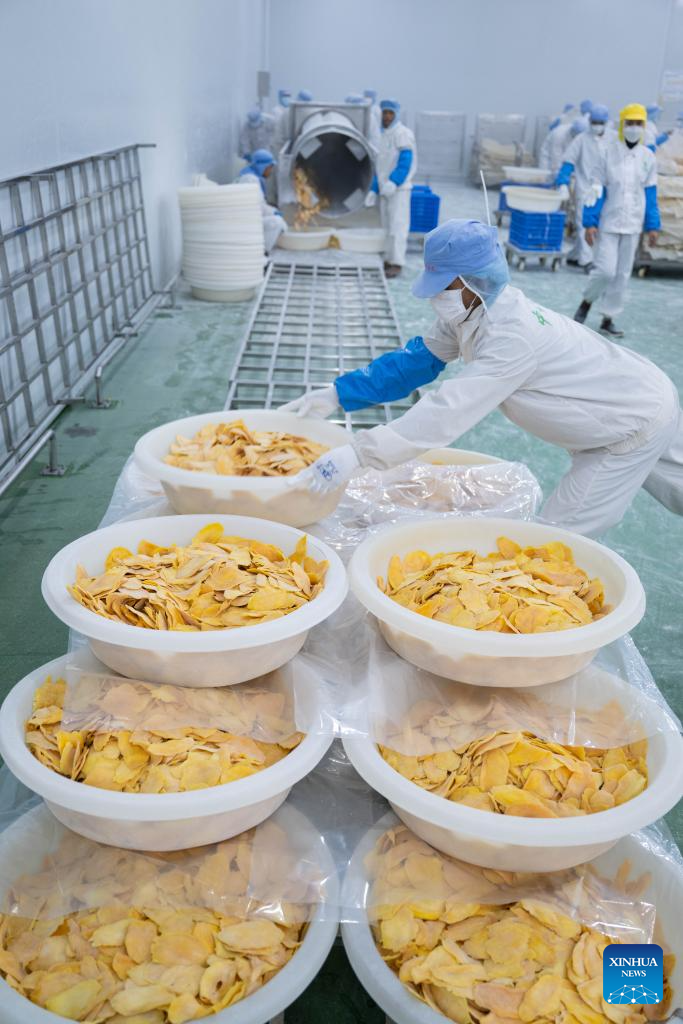
A worker transports dried mango slices at a mango processing factory in Phnom Sruoch district in Kampong Speu province, Cambodia, March 18, 2025. In western Cambodia's Phnom Sruoch district, the abundant sunshine, plentiful rainfall, and fertile soil provide ideal natural conditions for mango cultivation, yielding mangoes featuring tender flesh and rich aroma.
At the mango processing factory, invested and constructed by China's Zhong Bao (Fujian) Food Science & Technology Co. Ltd., in western Cambodia's Phnom Sruoch district, ripe mangoes undergo processes such as washing, peeling, slicing, sugar curing, and drying, finally transforming into sweet and chewy dried mango slices. These dried mangoes are then transported via sea shipping to Zhong Bao (Fujian) Food Science & Technology Co. Ltd. in southeast China's Fujian Province. After undergoing sorting, packaging, and packing, they can reach the shelves of Chinese supermarkets within days.
The Chinese-invested mango processing factory was put into use in January, 2021. Since then, it has not only created employment for over 2,600 local residents but also resolved the critical issue of market access for Cambodian farmers. China's purchase of Cambodian dried mangoes has not only benefited small-scale farmers and workers in this rural area, but also contributed to boosting the local economy. The standards, expertise, and advanced production lines introduced by Chinese enterprises have also helped improve the reputation of Cambodian mangoes in recent years. (Xinhua/Cheong Kam Ka)
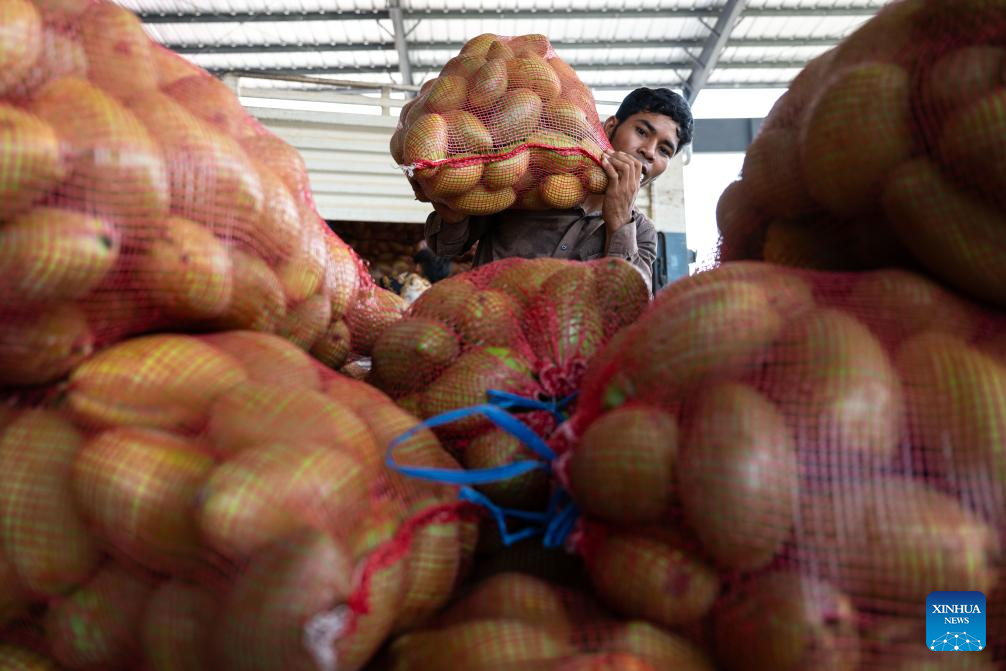
A worker carries a bag of mangoes at a mango processing factory in Phnom Sruoch district in Kampong Speu province, Cambodia, March 18, 2025. In western Cambodia's Phnom Sruoch district, the abundant sunshine, plentiful rainfall, and fertile soil provide ideal natural conditions for mango cultivation, yielding mangoes featuring tender flesh and rich aroma.
At the mango processing factory, invested and constructed by China's Zhong Bao (Fujian) Food Science & Technology Co. Ltd., in western Cambodia's Phnom Sruoch district, ripe mangoes undergo processes such as washing, peeling, slicing, sugar curing, and drying, finally transforming into sweet and chewy dried mango slices. These dried mangoes are then transported via sea shipping to Zhong Bao (Fujian) Food Science & Technology Co. Ltd. in southeast China's Fujian Province. After undergoing sorting, packaging, and packing, they can reach the shelves of Chinese supermarkets within days.
The Chinese-invested mango processing factory was put into use in January, 2021. Since then, it has not only created employment for over 2,600 local residents but also resolved the critical issue of market access for Cambodian farmers. China's purchase of Cambodian dried mangoes has not only benefited small-scale farmers and workers in this rural area, but also contributed to boosting the local economy. The standards, expertise, and advanced production lines introduced by Chinese enterprises have also helped improve the reputation of Cambodian mangoes in recent years. (Xinhua/Cheong Kam Ka)
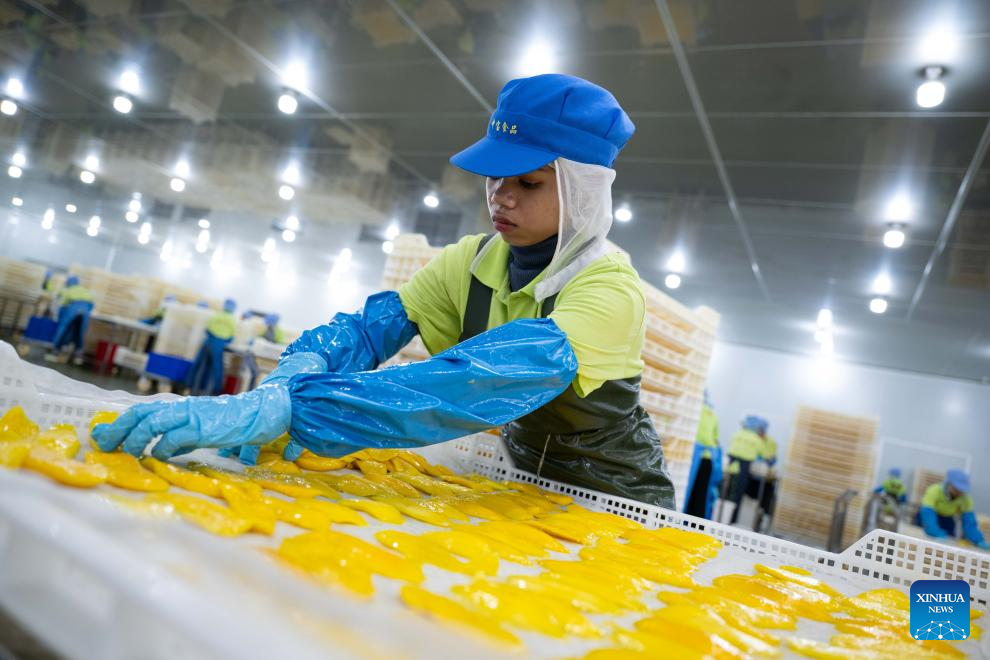
A worker prepares mango slices for drying at a mango processing factory in Phnom Sruoch district in Kampong Speu province, Cambodia, March 18, 2025. In western Cambodia's Phnom Sruoch district, the abundant sunshine, plentiful rainfall, and fertile soil provide ideal natural conditions for mango cultivation, yielding mangoes featuring tender flesh and rich aroma.
At the mango processing factory, invested and constructed by China's Zhong Bao (Fujian) Food Science & Technology Co. Ltd., in western Cambodia's Phnom Sruoch district, ripe mangoes undergo processes such as washing, peeling, slicing, sugar curing, and drying, finally transforming into sweet and chewy dried mango slices. These dried mangoes are then transported via sea shipping to Zhong Bao (Fujian) Food Science & Technology Co. Ltd. in southeast China's Fujian Province. After undergoing sorting, packaging, and packing, they can reach the shelves of Chinese supermarkets within days.
The Chinese-invested mango processing factory was put into use in January, 2021. Since then, it has not only created employment for over 2,600 local residents but also resolved the critical issue of market access for Cambodian farmers. China's purchase of Cambodian dried mangoes has not only benefited small-scale farmers and workers in this rural area, but also contributed to boosting the local economy. The standards, expertise, and advanced production lines introduced by Chinese enterprises have also helped improve the reputation of Cambodian mangoes in recent years. (Xinhua/Cheong Kam Ka)
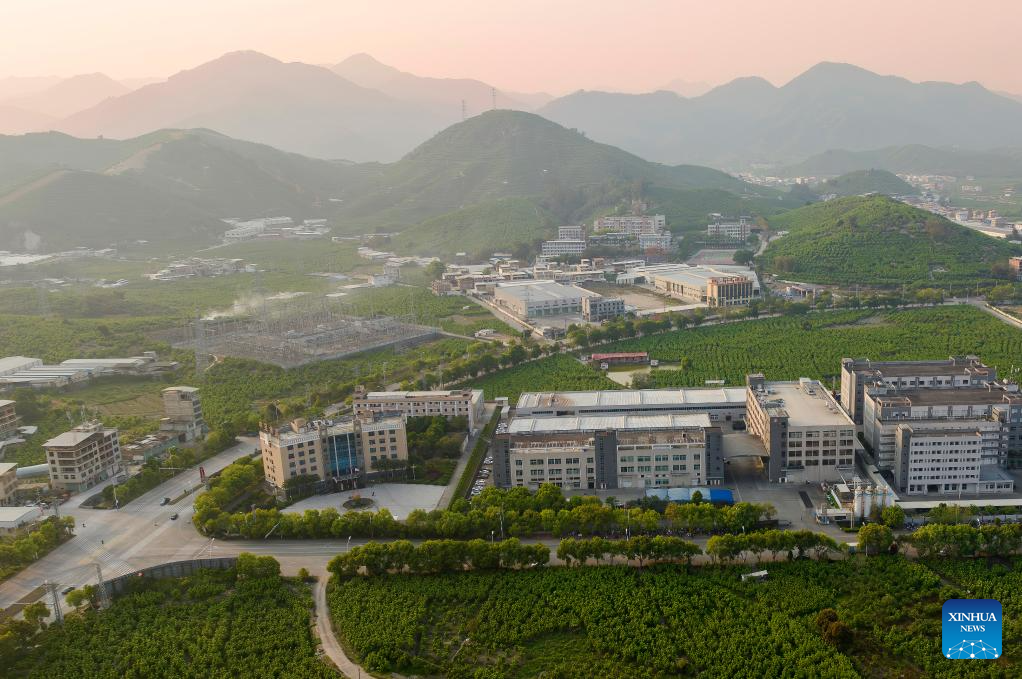
An aerial drone photo shows a view of Zhong Bao (Fujian) Food Science & Technology Co. Ltd. in Pinghe County of Zhangzhou City, southeast China's Fujian Province, March 26, 2025. In western Cambodia's Phnom Sruoch district, the abundant sunshine, plentiful rainfall, and fertile soil provide ideal natural conditions for mango cultivation, yielding mangoes featuring tender flesh and rich aroma.
At the mango processing factory, invested and constructed by China's Zhong Bao (Fujian) Food Science & Technology Co. Ltd., in western Cambodia's Phnom Sruoch district, ripe mangoes undergo processes such as washing, peeling, slicing, sugar curing, and drying, finally transforming into sweet and chewy dried mango slices. These dried mangoes are then transported via sea shipping to Zhong Bao (Fujian) Food Science & Technology Co. Ltd. in southeast China's Fujian Province. After undergoing sorting, packaging, and packing, they can reach the shelves of Chinese supermarkets within days.
The Chinese-invested mango processing factory was put into use in January, 2021. Since then, it has not only created employment for over 2,600 local residents but also resolved the critical issue of market access for Cambodian farmers. China's purchase of Cambodian dried mangoes has not only benefited small-scale farmers and workers in this rural area, but also contributed to boosting the local economy. The standards, expertise, and advanced production lines introduced by Chinese enterprises have also helped improve the reputation of Cambodian mangoes in recent years. (Xinhua/Wei Peiquan)
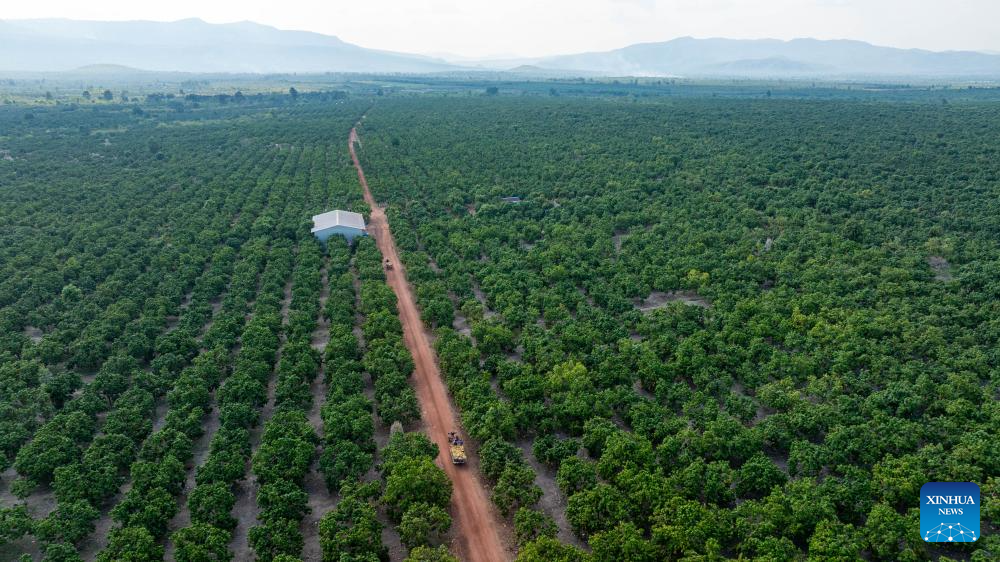
An aerial drone photo shows a mango orchard in Phnom Sruoch district in Kampong Speu province, Cambodia, March 18, 2025. In western Cambodia's Phnom Sruoch district, the abundant sunshine, plentiful rainfall, and fertile soil provide ideal natural conditions for mango cultivation, yielding mangoes featuring tender flesh and rich aroma.
At the mango processing factory, invested and constructed by China's Zhong Bao (Fujian) Food Science & Technology Co. Ltd., in western Cambodia's Phnom Sruoch district, ripe mangoes undergo processes such as washing, peeling, slicing, sugar curing, and drying, finally transforming into sweet and chewy dried mango slices. These dried mangoes are then transported via sea shipping to Zhong Bao (Fujian) Food Science & Technology Co. Ltd. in southeast China's Fujian Province. After undergoing sorting, packaging, and packing, they can reach the shelves of Chinese supermarkets within days.
The Chinese-invested mango processing factory was put into use in January, 2021. Since then, it has not only created employment for over 2,600 local residents but also resolved the critical issue of market access for Cambodian farmers. China's purchase of Cambodian dried mangoes has not only benefited small-scale farmers and workers in this rural area, but also contributed to boosting the local economy. The standards, expertise, and advanced production lines introduced by Chinese enterprises have also helped improve the reputation of Cambodian mangoes in recent years. (Xinhua/Cheong Kam Ka)
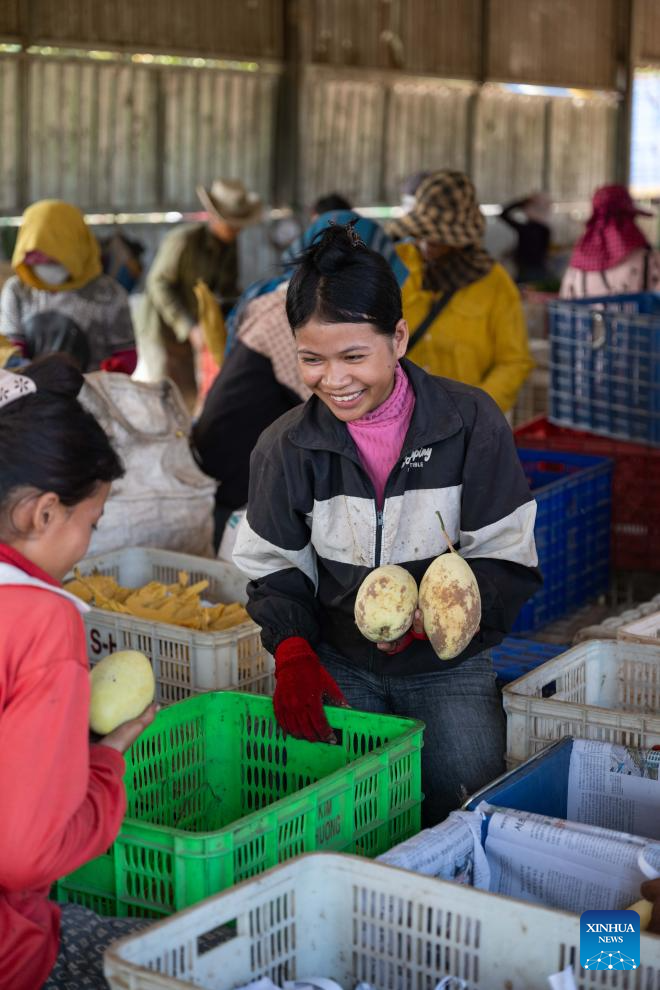
Workers sort mangoes at a mango orchard in Phnom Sruoch district in Kampong Speu province, Cambodia, March 18, 2025. In western Cambodia's Phnom Sruoch district, the abundant sunshine, plentiful rainfall, and fertile soil provide ideal natural conditions for mango cultivation, yielding mangoes featuring tender flesh and rich aroma.
At the mango processing factory, invested and constructed by China's Zhong Bao (Fujian) Food Science & Technology Co. Ltd., in western Cambodia's Phnom Sruoch district, ripe mangoes undergo processes such as washing, peeling, slicing, sugar curing, and drying, finally transforming into sweet and chewy dried mango slices. These dried mangoes are then transported via sea shipping to Zhong Bao (Fujian) Food Science & Technology Co. Ltd. in southeast China's Fujian Province. After undergoing sorting, packaging, and packing, they can reach the shelves of Chinese supermarkets within days.
The Chinese-invested mango processing factory was put into use in January, 2021. Since then, it has not only created employment for over 2,600 local residents but also resolved the critical issue of market access for Cambodian farmers. China's purchase of Cambodian dried mangoes has not only benefited small-scale farmers and workers in this rural area, but also contributed to boosting the local economy. The standards, expertise, and advanced production lines introduced by Chinese enterprises have also helped improve the reputation of Cambodian mangoes in recent years. (Xinhua/Cheong Kam Ka)
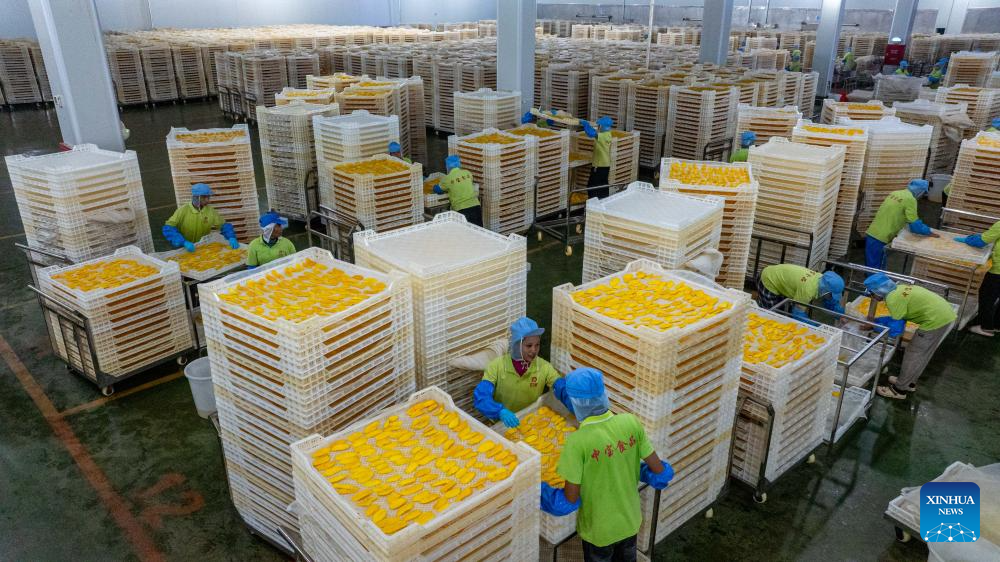
A drone photo shows workers arranging mango slices at a mango processing factory in Phnom Sruoch district in Kampong Speu province, Cambodia, March 18, 2025. In western Cambodia's Phnom Sruoch district, the abundant sunshine, plentiful rainfall, and fertile soil provide ideal natural conditions for mango cultivation, yielding mangoes featuring tender flesh and rich aroma.
At the mango processing factory, invested and constructed by China's Zhong Bao (Fujian) Food Science & Technology Co. Ltd., in western Cambodia's Phnom Sruoch district, ripe mangoes undergo processes such as washing, peeling, slicing, sugar curing, and drying, finally transforming into sweet and chewy dried mango slices. These dried mangoes are then transported via sea shipping to Zhong Bao (Fujian) Food Science & Technology Co. Ltd. in southeast China's Fujian Province. After undergoing sorting, packaging, and packing, they can reach the shelves of Chinese supermarkets within days.
The Chinese-invested mango processing factory was put into use in January, 2021. Since then, it has not only created employment for over 2,600 local residents but also resolved the critical issue of market access for Cambodian farmers. China's purchase of Cambodian dried mangoes has not only benefited small-scale farmers and workers in this rural area, but also contributed to boosting the local economy. The standards, expertise, and advanced production lines introduced by Chinese enterprises have also helped improve the reputation of Cambodian mangoes in recent years. (Xinhua/Cheong Kam Ka)
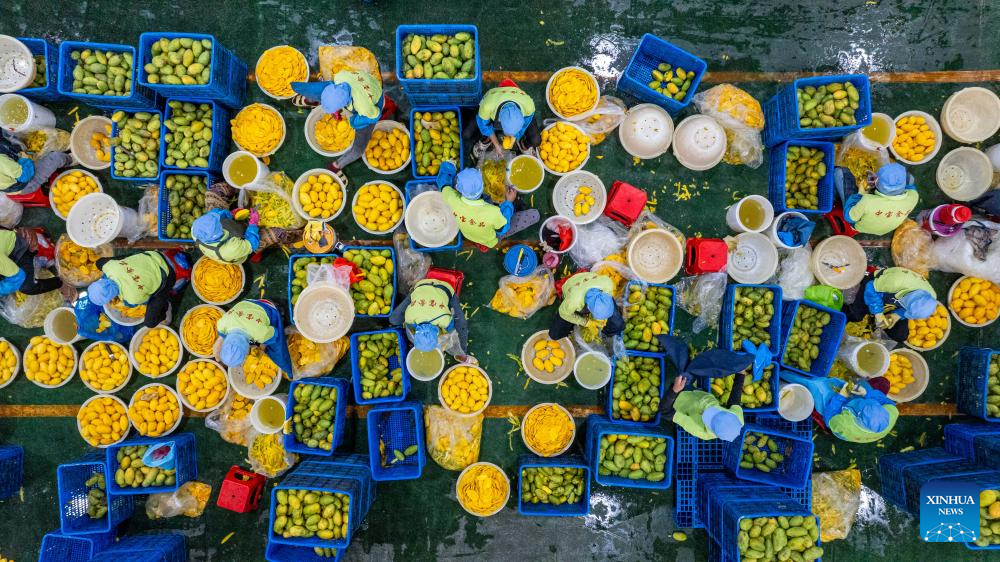
An aerial drone photo shows workers peeling mangoes at a mango processing factory in Phnom Sruoch district in Kampong Speu province, Cambodia, March 18, 2025. In western Cambodia's Phnom Sruoch district, the abundant sunshine, plentiful rainfall, and fertile soil provide ideal natural conditions for mango cultivation, yielding mangoes featuring tender flesh and rich aroma.
At the mango processing factory, invested and constructed by China's Zhong Bao (Fujian) Food Science & Technology Co. Ltd., in western Cambodia's Phnom Sruoch district, ripe mangoes undergo processes such as washing, peeling, slicing, sugar curing, and drying, finally transforming into sweet and chewy dried mango slices. These dried mangoes are then transported via sea shipping to Zhong Bao (Fujian) Food Science & Technology Co. Ltd. in southeast China's Fujian Province. After undergoing sorting, packaging, and packing, they can reach the shelves of Chinese supermarkets within days.
The Chinese-invested mango processing factory was put into use in January, 2021. Since then, it has not only created employment for over 2,600 local residents but also resolved the critical issue of market access for Cambodian farmers. China's purchase of Cambodian dried mangoes has not only benefited small-scale farmers and workers in this rural area, but also contributed to boosting the local economy. The standards, expertise, and advanced production lines introduced by Chinese enterprises have also helped improve the reputation of Cambodian mangoes in recent years. (Xinhua/Cheong Kam Ka)
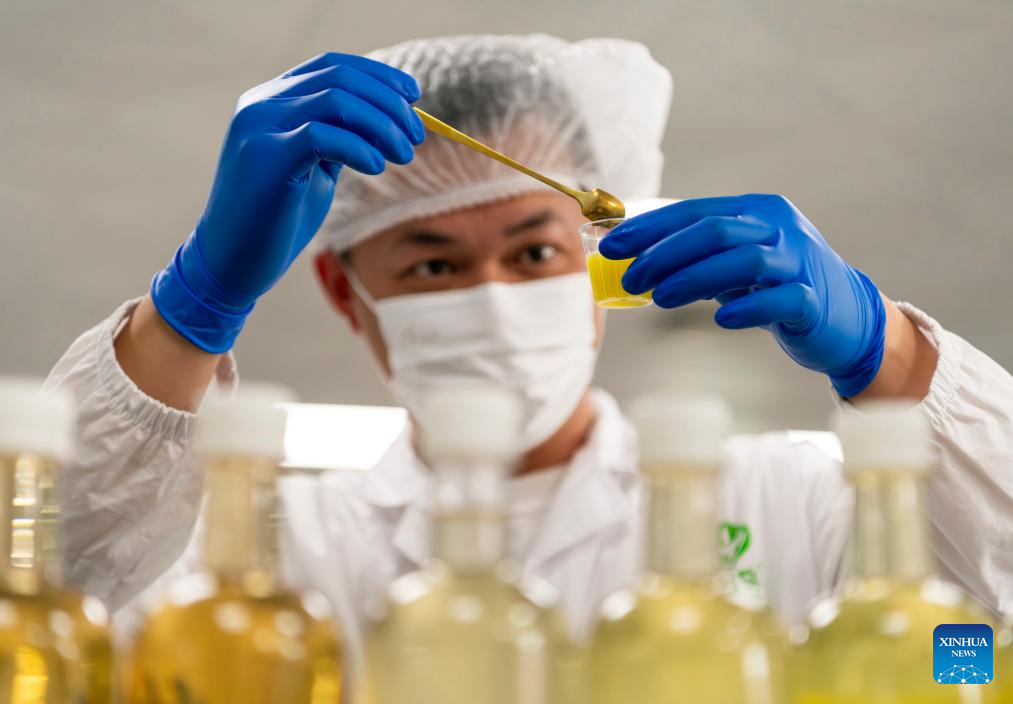
A staff member checks the quality of mango drinks at the technology center of Zhong Bao (Fujian) Food Science & Technology Co. Ltd. in Pinghe County of Zhangzhou City, southeast China's Fujian Province, March 26, 2025. In western Cambodia's Phnom Sruoch district, the abundant sunshine, plentiful rainfall, and fertile soil provide ideal natural conditions for mango cultivation, yielding mangoes featuring tender flesh and rich aroma.
At the mango processing factory, invested and constructed by China's Zhong Bao (Fujian) Food Science & Technology Co. Ltd., in western Cambodia's Phnom Sruoch district, ripe mangoes undergo processes such as washing, peeling, slicing, sugar curing, and drying, finally transforming into sweet and chewy dried mango slices. These dried mangoes are then transported via sea shipping to Zhong Bao (Fujian) Food Science & Technology Co. Ltd. in southeast China's Fujian Province. After undergoing sorting, packaging, and packing, they can reach the shelves of Chinese supermarkets within days.
The Chinese-invested mango processing factory was put into use in January, 2021. Since then, it has not only created employment for over 2,600 local residents but also resolved the critical issue of market access for Cambodian farmers. China's purchase of Cambodian dried mangoes has not only benefited small-scale farmers and workers in this rural area, but also contributed to boosting the local economy. The standards, expertise, and advanced production lines introduced by Chinese enterprises have also helped improve the reputation of Cambodian mangoes in recent years. (Xinhua/Wei Peiquan)
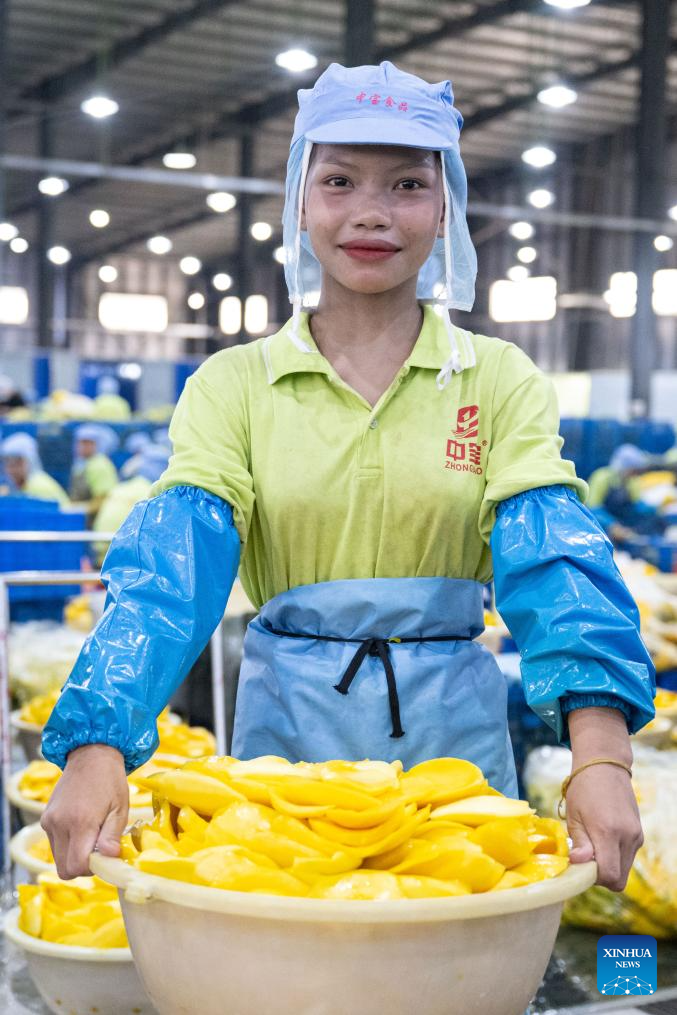
A worker displays mango slices at a mango processing factory in Phnom Sruoch district in Kampong Speu province, Cambodia, March 18, 2025. In western Cambodia's Phnom Sruoch district, the abundant sunshine, plentiful rainfall, and fertile soil provide ideal natural conditions for mango cultivation, yielding mangoes featuring tender flesh and rich aroma.
At the mango processing factory, invested and constructed by China's Zhong Bao (Fujian) Food Science & Technology Co. Ltd., in western Cambodia's Phnom Sruoch district, ripe mangoes undergo processes such as washing, peeling, slicing, sugar curing, and drying, finally transforming into sweet and chewy dried mango slices. These dried mangoes are then transported via sea shipping to Zhong Bao (Fujian) Food Science & Technology Co. Ltd. in southeast China's Fujian Province. After undergoing sorting, packaging, and packing, they can reach the shelves of Chinese supermarkets within days.
The Chinese-invested mango processing factory was put into use in January, 2021. Since then, it has not only created employment for over 2,600 local residents but also resolved the critical issue of market access for Cambodian farmers. China's purchase of Cambodian dried mangoes has not only benefited small-scale farmers and workers in this rural area, but also contributed to boosting the local economy. The standards, expertise, and advanced production lines introduced by Chinese enterprises have also helped improve the reputation of Cambodian mangoes in recent years. (Xinhua/Cheong Kam Ka)
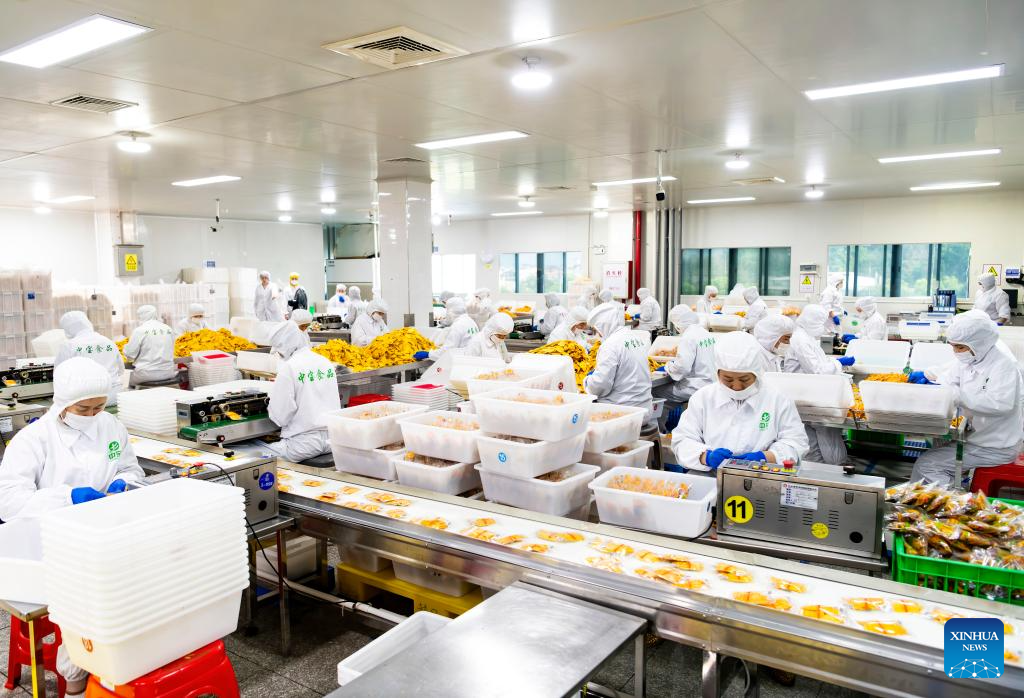
Workers are seen busy on the food processing line of Zhong Bao (Fujian) Food Science & Technology Co. Ltd. in Pinghe County of Zhangzhou City, southeast China's Fujian Province, March 26, 2025. In western Cambodia's Phnom Sruoch district, the abundant sunshine, plentiful rainfall, and fertile soil provide ideal natural conditions for mango cultivation, yielding mangoes featuring tender flesh and rich aroma.
At the mango processing factory, invested and constructed by China's Zhong Bao (Fujian) Food Science & Technology Co. Ltd., in western Cambodia's Phnom Sruoch district, ripe mangoes undergo processes such as washing, peeling, slicing, sugar curing, and drying, finally transforming into sweet and chewy dried mango slices. These dried mangoes are then transported via sea shipping to Zhong Bao (Fujian) Food Science & Technology Co. Ltd. in southeast China's Fujian Province. After undergoing sorting, packaging, and packing, they can reach the shelves of Chinese supermarkets within days.
The Chinese-invested mango processing factory was put into use in January, 2021. Since then, it has not only created employment for over 2,600 local residents but also resolved the critical issue of market access for Cambodian farmers. China's purchase of Cambodian dried mangoes has not only benefited small-scale farmers and workers in this rural area, but also contributed to boosting the local economy. The standards, expertise, and advanced production lines introduced by Chinese enterprises have also helped improve the reputation of Cambodian mangoes in recent years. (Xinhua/Wei Peiquan)
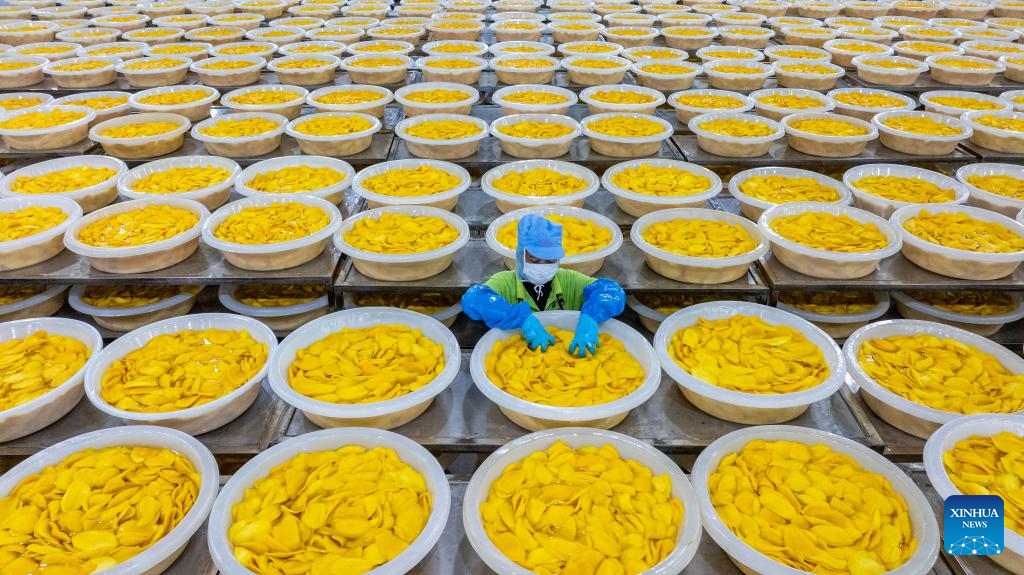
An aerial drone photo shows a worker examining the quality of mango slices at a mango processing factory in Phnom Sruoch district in Kampong Speu province, Cambodia, March 18, 2025. In western Cambodia's Phnom Sruoch district, the abundant sunshine, plentiful rainfall, and fertile soil provide ideal natural conditions for mango cultivation, yielding mangoes featuring tender flesh and rich aroma.
At the mango processing factory, invested and constructed by China's Zhong Bao (Fujian) Food Science & Technology Co. Ltd., in western Cambodia's Phnom Sruoch district, ripe mangoes undergo processes such as washing, peeling, slicing, sugar curing, and drying, finally transforming into sweet and chewy dried mango slices. These dried mangoes are then transported via sea shipping to Zhong Bao (Fujian) Food Science & Technology Co. Ltd. in southeast China's Fujian Province. After undergoing sorting, packaging, and packing, they can reach the shelves of Chinese supermarkets within days.
The Chinese-invested mango processing factory was put into use in January, 2021. Since then, it has not only created employment for over 2,600 local residents but also resolved the critical issue of market access for Cambodian farmers. China's purchase of Cambodian dried mangoes has not only benefited small-scale farmers and workers in this rural area, but also contributed to boosting the local economy. The standards, expertise, and advanced production lines introduced by Chinese enterprises have also helped improve the reputation of Cambodian mangoes in recent years. (Xinhua/Cheong Kam Ka)
